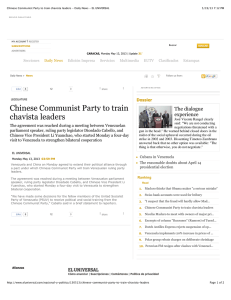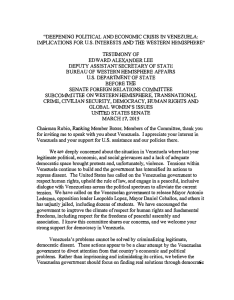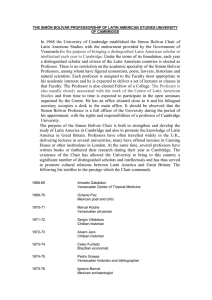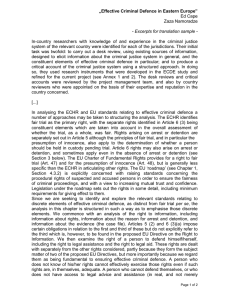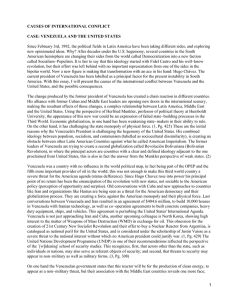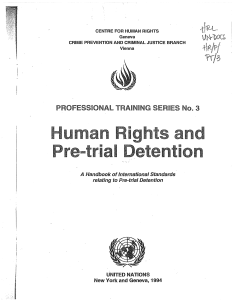The Execution of Justice: The Criminal Trial of Judge María Lourdes
Anuncio
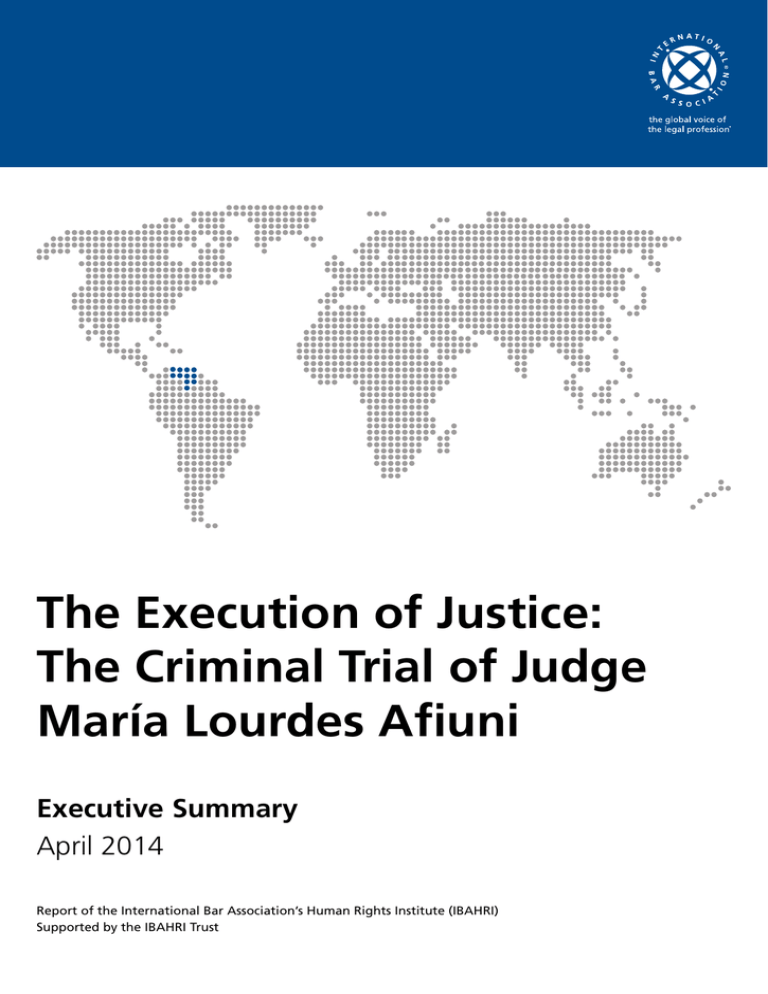
The Execution of Justice: The Criminal Trial of Judge María Lourdes Afiuni Executive Summary April 2014 Report of the International Bar Association’s Human Rights Institute (IBAHRI) Supported by the IBAHRI Trust Material contained in this report may be freely quoted or reprinted, provided credit is given to the International Bar Association International Bar Association 4th Floor, 10 St Bride Street London EC4A 4AD, United Kingdom Tel: +44 (0)20 7842 0090 Fax: +44 (0)20 7842 0091 Website: www.ibanet.org Acknowledgements The IBAHRI would like to express its gratitude to all those who supported and contributed to the production of the report. In particular, the IBAHRI thanks its trial observers Emilio Ginés, Jordi Morató-Aragonés Pamies, Luis Fernando Vargas Rodríguez, Luis Francisco Vargas Osorno, Claudio Morer Giménez, and Esther Llorente Fernández and its Venezuelan colleagues for their time, assistance and dedication. The IBAHRI would also like to thank IBAHRI interns Gabriela Maldonado-Colmenares, Raquel Perez, Victoria Rebori, Sara Vila, Nerea Goyoaga and Ginna Romero Pauwells for their invaluable assistance in the drafting and preparation of this report. Executive Summary The trial of Judge María Lourdes Afiuni is one of the most important political cases in the State of the Bolivarian Republic of Venezuela (‘Venezuela’) and emblematic of the lack of judicial independence in the country. This is the IBAHRI’s sixth report on Venezuela and each time it finds that the separation between the executive and judicial powers is diminishing.1 On 11 December 2009 Judge Afiuni was arbitrarily arrested without a warrant and without reasons for her arrest following her decision to release a so-called ‘political prisoner’ in accordance with the Venezuelan Penal Code and a United Nations Working Group on Arbitrary Detention decision. Immediately after her arrest, the late president Hugo Chávez Frías appeared on national television calling for her imprisonment for 30 years and said that her case should be an example to other judges. Judge Afiuni was detained for over a year in a maximum security facility, in the same prison as individuals who she herself had sentenced. She suffered death threats and grievous physical abuse, which, combined with a lack of access to adequate medical treatment, resulted in an emergency operation after which she was transferred to house arrest in February 2011. Following a visit to Caracas shortly after her transfer in 2011, the IBAHRI concluded that Judge Afiuni had suffered multiple due process and human rights violations during her arrest, detention and the initial procedural phases of her trial.2 Furthermore, the IBAHRI was deeply concerned by not only the suffering of Judge Afiuni but also the impact of the criminal trial on the independence of the Venezuelan judiciary, which was already under serious threat. The delegation found that the case had created an atmosphere of fear amongst judges, known as the ‘Afiuni effect’, and heard frequently that ‘no one wants to be the next Afiuni’. On the basis that the late president Hugo Chávez Frías himself said her case should be an example for other judges, the IBAHRI considered it important to maintain an independent international observation at her trial. After much delay, the trial began in November 2013. However, on 23 October 2014 the prosecution failed to attend an evidentiary hearing causing the trial to be ‘interrupted’ and annulled. The court has ordered a re-trial; however, at the time of writing it is unclear when this will be, largely because of the political nature of the case. The IBAHRI is grateful to the Venezuelan authorities for allowing its international observers to attend the hearings. It is clear, however, that no steps have been taken either to ensure a fair trial for Judge Afiuni or to address the systemic lack of judicial independence in the country, as identified in the IBAHRI’s previous five reports. Four years have passed since Afiuni’s arrest and, with no final decision in sight, she remains in a Kafkaesque criminal process that has been characterised by multiple human rights violations. 1 International Bar Association’s Human Rights Institute (IBAHRI), Introductory Report on the Administration of Justice in Peru and Venezuela (March 1999); IBAHRI, Venezuelan Justice System in Crisis (March 2003); IBAHRI, Justice under threat: A report on the rule of law in Venezuela (June 2007); IBAHRI, Distrust in Justice: The Afiuni Case and the Independence of the Judiciary in Venezuela (April 2011); IBAHRI, The Criminal Trial of Venezuelan Lawyer José Amalio Graterol (November 2013). All reports are available at www.ibanet.org/Human_Rights_Institute/HRI_Publications/Other_ HRI_Publications.aspx, last accessed 10 March 2014. 2 IBAHRI 2011 (n 1), pp 15–22. APRIL 2014 The Execution of Justice: The Criminal Trial of Judge María Lourdes Afiuni: Executive Summary3 From the outset, the IBAHRI considers that the Venezuelan criminal justice system – in particular the system of provisional judges, the lack of implementation of the judicial code of ethics and inadequate parameters regarding the appointment and removal process for judges, as well as frequent executive interference – does not contain adequate systemic safeguards to guarantee judicial independence, violating Judge Afiuni’s right to fair trial by an independent and impartial tribunal. The IBAHRI concludes that Judge Afiuni has been subjected to multiple due process and human rights violations throughout her trial. The following irregularities are of particular concern: (i) On 11 December 2009 Judge Afiuni was arbitrarily arrested without a warrant and without reasons for her arrest following her release of a so-called ‘political prisoner’ in accordance with the Venezuelan Penal Code and a UN Working Group on Arbitrary Detention decision. (ii) The late president Hugo Chávez Frías immediately appeared on national television calling for her imprisonment and saying that her case should be an example to other judges. This violated her right to the presumption of innocence and was a serious interference in the independence of the judiciary. (iii)Between December 2009 and February 2011, Judge Afiuni was subjected to grievous physical abuse in a female maximum security prison, the Instituto Nacional de Orientación Femenina, which amounted to violations of her right to life, liberty, personal integrity and adequate conditions of detention. She was also denied access to appropriate medical treatment, which led to health complications and an emergency operation. (iv) During the preliminary hearing on 17 May 2010, the Public Prosecutor admitted that there was no tangible evidence of a bribe in relation to the corruption charge against her but argued that the ‘benefit’ she had obtained was the freedom of the prisoner. Nevertheless, the court admitted the charge and ordered the continuation of her pre-trial detention on that basis, in violation of Venezuelan criminal procedure. (v) While Judge Afiuni’s release to house arrest following an emergency operation in February 2011 represented an improvement to the conditions of detention, her house arrest was still an arbitrary detention and its terms were excessively restrictive and contrary to Venezuelan criminal procedure. (vi) The public prosecutor did not produce sufficient evidence at any stage of the trial to substantiate the allegations against Afiuni. (vii)The frequent procedural delays caused by the presiding judge and the prosecution failing to appear at the trial for various inadequate reasons (family, holidays, administrative reasons) resulted in hearings being postponed approximately 24 times between February 2011 and December 2013. This has resulted in a criminal process that has been drawn out to over four years, which the IBAHRI considers a violation of her right to be tried within a reasonable time. 4 The Execution of Justice: The Criminal Trial of Judge María Lourdes Afiuni: Executive Summary APRIL 2014 In view of the fact that the late president Hugo Chávez Frías stated publicly that her arrest should ‘serve as an example to those who think of doing the same’ as well as the lack of evidence against her, the IBAHRI concludes that Judge Afiuni was arrested and tried in retaliation for exercising her professional duties independently and releasing a so-called ‘political prisoner’. The IBAHRI also finds it difficult to escape the conclusion that José Amalio Graterol, Afiuni’s defence lawyer, was tried and convicted in retaliation for his work as Afiuni’s defence lawyer and his criticisms of the judiciary’s handling of the case.3 The IBAHRI remains deeply concerned at the impact of the Afiuni and Graterol cases on the independence of the judiciary and the legal profession in Venezuela, with judges and lawyers fearful of the consequences of returning decisions or taking politically unpopular cases. Given that Venezuela is a member of the UN Human Rights Council (2013–2016), the IBAHRI considers it particularly important for it to demonstrate its commitment to the international human rights instruments that it has signed, as well as to the UN system in general, by ensuring not only that it respects and upholds domestic and international human rights standards, but also that it implements decisions of UN bodies, including the UN Working Group on Arbitrary Detention which has called repeatedly for Afiuni’s release. Recommendations to the State of the Bolivarian Republic of Venezuela: • to drop all charges against María Lourdes Afiuni and to compensate her for the physical and mental damage she has suffered; • restore Judge Afiuni’s position as an acting judge; • to annul the conviction of Judge Afiuni’s defence lawyer, José Amalio Graterol; • to take the necessary steps to ensure the separation of powers and independence of the legal profession in Venezuela, especially the recommendations made to the Government of Venezuela in the IBAHRI’s 2011 Report,4 including to eliminate the regime of provisional judges, to include transparent safeguards into the appointment and dismissal process of judges and to refrain from executive interference in the independence of the judiciary, through public statements or otherwise; and • to respect the international human rights instruments that it has signed, as well as the UN system in general, by ensuring not only that it upholds domestic and international human rights standards, but also that it implements decisions of UN bodies, including the UN Working Group on Arbitrary Detention which has called for Afiuni’s release. 3 IBAHRI 2013 (n 1), pp 5, 16–17. 4 See n 1. APRIL 2014 The Execution of Justice: The Criminal Trial of Judge María Lourdes Afiuni: Executive Summary5 International Bar Association 4th Floor, 10 St Bride Street London EC4A 4AD, United Kingdom Tel: +44 (0)20 7842 0090 Fax: +44 (0)20 7842 0091 Website: www.ibanet.org
